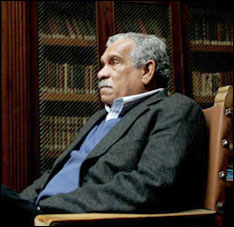Nobel laureate Derek Walcott turns his back on Oxford University to take up a poetry professorship at the University of Essex
 Following the most ferocious scandal the poetry world has experienced for years, during which favourite Derek Walcott withdrew from the race for the Oxford poetry professorship, he is next year to be made professor of poetry after all: but at the University of Essex, rather than Oxford.
Following the most ferocious scandal the poetry world has experienced for years, during which favourite Derek Walcott withdrew from the race for the Oxford poetry professorship, he is next year to be made professor of poetry after all: but at the University of Essex, rather than Oxford.
The university announced today that Walcott, who won the Nobel prize for literature in 1992, would be visiting the Colchester campus in April 2010 for the first of two visits, during which he will deliver student workshops and a public reading. He last visited the university in 2008, when he was awarded an honorary degree.
Walcott had been considered the front runner for the Oxford professorship – British poetry's most prestigious appointment, with a lineage dating back to the 18th century and including the likes of Matthew Arnold, WH Auden and Seamus Heaney – when an anonymous campaign saw some 200 Oxford academics sent photocopied pages from a book detailing a sexual harassment claim made against Walcott by a student at Harvard in 1982.
The Nobel laureate resigned from the race on 12 May, and his chief rival Ruth Padel was appointed to the role – but she resigned nine days later, after it emerged that she had alerted two journalists to the allegations, and as yet it remains unfilled.
In a statement issued today, the University of Essex said: "We are aware of the allegations made against Professor Walcott in the 1980s which were revived in the media during the election for Oxford University's professor of poetry position earlier in the year, causing him to withdraw his candidacy. However, the university is focused on giving its students and the literary community the rare opportunity to benefit from working with an internationally acclaimed writer."
Senior lecturer Dr Maria Cristina Fumagalli, an expert on Walcott's work who had been very keen to persuade him to return to the university, said she had no concerns whatsoever about appointing him to a teaching role: "Not at all. I met Walcott for the first time as a graduate student. He was very inspiring and I wanted that kind of inspiration for my students."
The idea for the appointment – which revives a tradition of appointing poetry professors at Essex that had included the likes of Robert Lowell before it was discontinued at the end of the 1970s – had nothing to do with the summer's row in Oxford, Dr Fumagalli insisted. "The idea dates back to his visit to the university in 2008. When he was here, he was very generous with his time talking to students and it was a huge boost for them, and we were very keen to persuade him to return.
"This is an incredible opportunity, not only for our students but for the general public. Very rarely do people get the chance to learn directly from a writer of this calibre."
Walcott, who is due to publish a new collection of poems, White Egrets, in 2010, said: "I am delighted to be professor of poetry at the University of Essex. When I was awarded my honorary doctorate last year I was impressed by the warm atmosphere and intellectual drive of the department of literature, film, and theatre studies which is home to formidable scholars and committed Caribbeanists. While I was there I also had the opportunity to meet talented and enthusiastic students and I am really looking forward to working with this cohort of emerging writers."
Author and critic Marina Warner, who is also a professor at the university, added: "It is a marvellous and exciting boon ... The university is approaching its 50th anniversary, and since its foundation under the poet Donald Davie, the Department of Literature, Film, and Theatre Studies has hosted international writers and poets. Our strong tradition of research and teaching in creative writing as well as in the literature of the Caribbean is growing vigorously, and Walcott's presence will be an added inspiration."
Guardian
25 December 2009